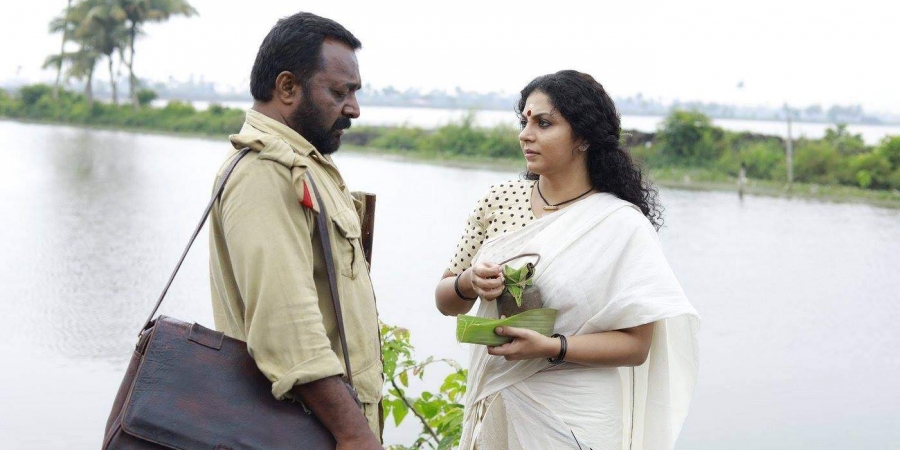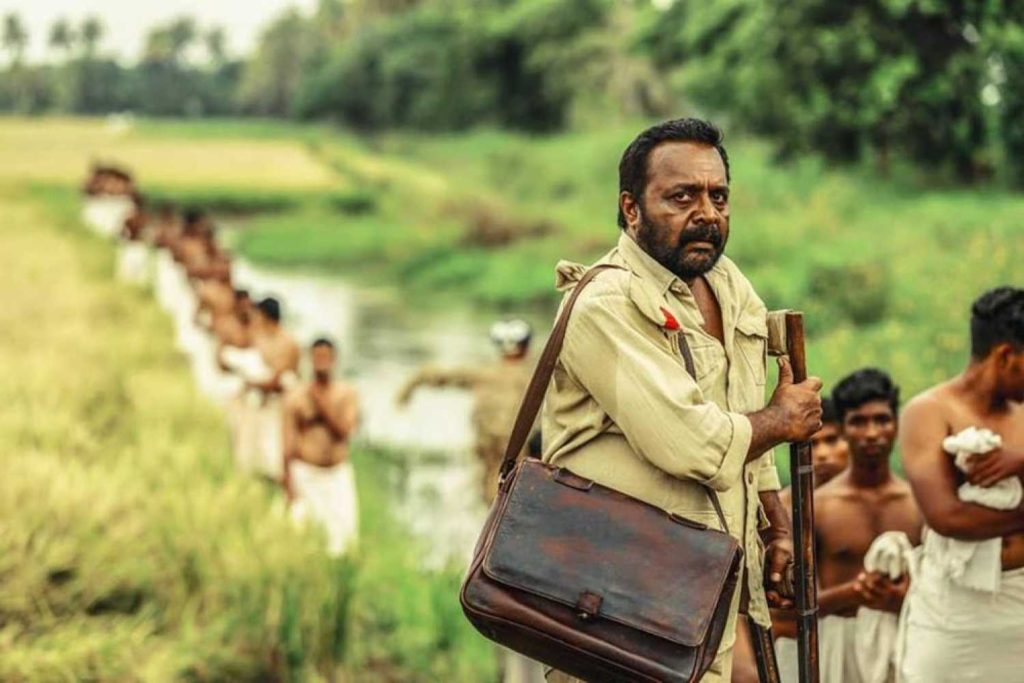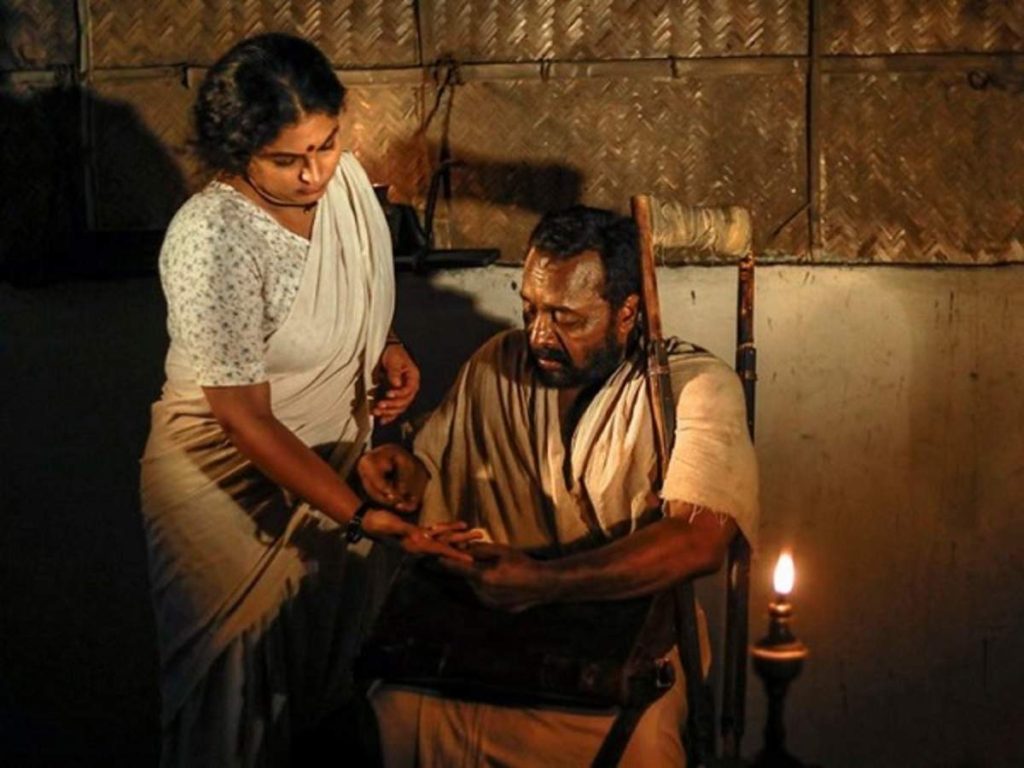
Director Jayaraj’s famed navarasa series has always been of great intrigue. Some were a class apart (Shantam), some middling (Bhibhatsa) and some wholly unremarkable (Veeram). In his 2018 film Bhayanakam, the filmmaker attempts to depict the air of mammoth fear which prevailed in Kerala during the terrifying period of World War II.
Jayaraj’s protagonist (I don’t remember him being addressed by an actual name) is a postman by vocation. An injured veteran from World War I, the man is posted in Kerala’s backwaters-bound Kuttanad. The state-wide situation is that of extreme poverty where hoarders hoarded and the poor craved for a basketful of grain. This adversity leads the families to force their able-bodied sons to join the British Army, who eventually go on to fight to dubious world war.
Travelling solo in his wooden country boat, the limping postman is a familiar sight in the locality. In the apparent absence of a family, he resides with a woman called Gowri Kunjamma (Asha Sarath). An attractive woman, presumably in her late 30s or early 40s, Kunjamma’s sons, too, are employed in the army.

Shot exquisitely in a delectable sepia mould by DOP Nikhil S. Praveen, Bhayanakam’s mind-boggling cinematography is one to savour, scene by scene. Together with some stellar assemblage of frames (editing by Jinu Sobha and Afsal A. M), Nikhil’s camera is perennially observant. Sometimes tellingly panoramic and otherwise using symmetry in a fashion that it does not look a bit forced, Bhayanakam also bags full marks for its motion techniques. Emotions – be it emptiness, angst or happiness – come together beautifully through the film’s dynamic visual language. Extending the technical marvel further is the original score (M. K. Arjunan) and the period-relevant dialogues which come sans an iota of phoniness.
Jayaraj, probably alarmed by the Veeram misfire, keeps the sound and fury duly in check. The violence that the film contains is solely implied which in numerous ways multiplies the fright in the air. The writing is interspersed with a long-list of secondary and tertiary players who add perspectives galore to the story while revealing the needs, living conditions and thought processes of the people from the era.
ALSO READ: ‘Kayamkulam Kochunni’ – a staid bandit drama with striking visuals and Mohanlal swagger
It was particularly astonishing to see the postman dumbstruck by an innocent child’s question, “If so many are dying then for whom is this war?” Another highlight of his screenplay is the way it presents the nature of his relationship with Kunjamma. Portrayed with an otherworldly righteous halo, the woman develops a tender bond which resembles the one between a workhorse husband and his dutiful wife. The woman’s mystique could be one that draws him into her. Yet, the film refuses to project Kunjamma as a temptress. The vagueness in their equation is precisely what lights up their chemistry. Therefore, it comes as a major tumult when the postman doesn’t want a piece of bad news to shatter Kunjamma’s caring, house-proud demeanour – which only adds up to his mounting internal turmoil.
Talking about those chapters in the screenplay (adapted from Thakazhi’s Kayar), we observe how the villagers treat the postman as an omen-equivalent. In the pre-war segments, his arrival with letters and money orders were equated to happiness and/or a signal of good times – Onam, marriages and more. Once the war begins, the postman, overloaded with telegrams, containing “the” bad news for the very same families immediately turn into ‘the messenger of death’. We see unassuming families run in the opposite direction upon sighting the limping man from a distance. In perhaps the most affecting scene in the film, an impoverished farmer requests the postman to never show him his face again – be it with a money order or a telegram – so that there exists a hopeful life ahead, where he would assume that his son is alive in some corner of the world. The duo share a smoke later on, underneath a tiny umbrella, barely securing each other from the torrential rain. Another heartbreak image is that of an ageing grandfather who yells out from the shore, “When will my grandson return?”, hearing which the postman paddles away in silence.
In Bhayanakam, Jayaraj impressively projects the same peripheral players in days of prosperity as well as in those of terror. In the former stage, the postman is invited to family gatherings and festivals whereas in the latter he gets pushed and smeared with mud. That said, wading with difficulty through this rough profession, his sanity remains unaffected on the surface. Deep within, the postman goes through an ocean of emotions that he could never share with anyone – not even with Kunjamma.

Playing the central character, Renji Panicker is marvellous in his part where he ought to express every emotion with a bare minimum of expressions. Easily his career-best turn in acting, Panicker proves how there’s a lot more in him that the industry is yet to utilize to the fullest. Asha Sarath, in a gorgeously penned character, revels in all the ambiguous shades that she has been given. Complete with her curly-haired look, she paints a striking picture of the confident, adroit Malayali woman from the ’30s and the ’40s.
Jayaraj’s storytelling style, too, is on a major high after a long while as Bhayanakam consistently maintains its frightening mood. The screenplay, the performers and the techniques are so much in tandem that there could not have been a better way to pay a tribute to the Malayali martyrs of the Second World War. There is also a fine balance to everything that Bhayanakam chooses to integrate with its narrative. Besides the absence of any direct British-bashing, the film also poses no stereotypical situation where a character touches the crescendo of happiness and later faces a massive thud. The minimalism (in colours, lines, expression and imagery) lets Bhayanakam concoct precisely what the rasa in question is all about – fear. Just when I was missing an iota of dramatics in the film, there I watched the finale involving two paper boats, the postman and the sparkling backwaters by the night. If this isn’t a masterful closure to a story of great emotional intensity, nothing else is.
Rating: ★★★★

